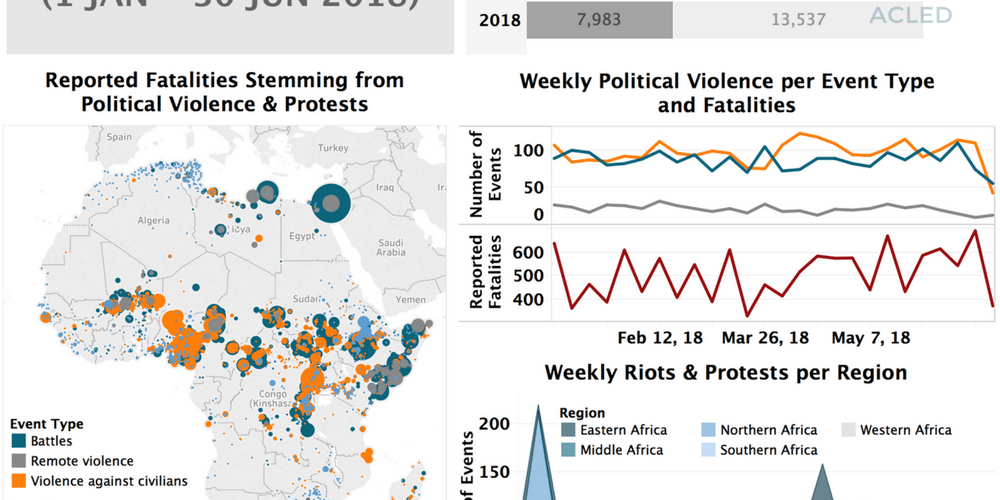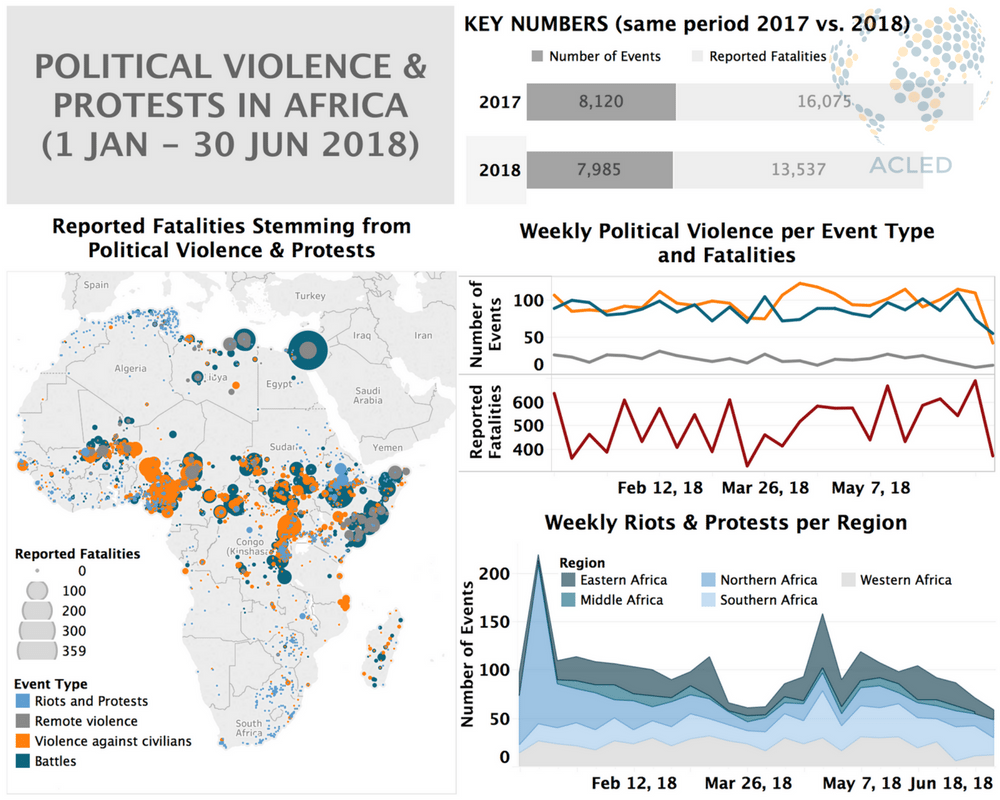Important developments in Africa in the week of June 24th included the Fulani violence in Nigeria and Benin; the high militant activity in Cameroon, Egypt and Mali; the tensions in CAR’s Nana-Gribizi prefecture; and the continued violence in South Sudan tainting the progress made simultaneously at the negotiations’ table. Relevant protests and riots also occurred on the continent on that week and will be the subject of a separate ACLED update.
Violence involving members of the Fulani group continues to be widespread across the African continent. The large, coordinated and multi-day attack on Berom farmers in Nigeria’s Plateau state by Fulani militiamen on June 23rd was a stark reminder of the dangerous evolution of intercommunal violence in the country. The fatality toll was approximated to be 200 people. The government deployed additional troops right after the attacks to Plateau, as well as to neighbouring Benue and Taraba states. Yet, the various protests and riots held in the state in subsequent days underlined the frustration, particularly among non-Fulani communities, over the slow government response to the rising Fulani crisis. In Benin, the killing of two civilians in Igbo-Igana in Plateau department by Fulani militiamen after cattle theft revealed the rising tensions between Fulani herders and local farmers over land sharing across the region. Fulani violence has been higher in the first six months of 2018 in Benin than over the two preceding years combined. In other contexts, Fulani communities are increasingly the targets of violence. In Mali’s Mopti region for instance, they are regularly targeted by a range of actors, from Dozo militiamen, to the Movement for Azawad Salvation (MSA) and the Imghad Tuareg and Allies Self-Defense Group (GATIA). Over June 23-24th, the Dozos attacked them in Koumaga village in Mopti for instance, leaving at least 35 killed; on June 30th, GATIA militiamen killed another two in Ebang Malen in Gao region.
Activity by other non-state armed actors was also noticeable in a number of countries on the week of June 24th. In Cameroon, Boko Haram was particularly active, with nearly daily attacks against the state forces or against civilians between June 24-30th spanning Mayo-Tsanaga, Mayo-Sava and Logone-et-Chari in Extreme-Nord. In the Central African Republic (CAR), tensions rose in Nana-Gribizi prefecture after elements of the Patriotic Movement for Central African Republic (MPC) attacked villages in the Mbres area on June 22nd. The next day, Anti-Balaka gunmen erected barricades to prevent MINUSCA soldiers from travelling to the area. The latter allegedly opened fire on civilians in reprisal. The situation further flared up in the Mres area a few days later, over June 28-29th, as MPC clashed with Anti-Balaka elements. In the Haut-Mbomou and Haute-Kotto prefectures, abductions and lootings have risen since mid-June as militants of the Lord’s Resistance Army (LRA) resumed their operations, particularly around Obo.
In Mali, a complex attack involving an explosive-laden vehicle and an armed assault by the Group for Support of Islam and Muslims (JNIM) demolished the G5 Sahel-Force headquarters in Sevare, Mopti region. In Egypt, the government’s extension of the state of emergency for another three months on June 24th coincided with reports of higher activity by State of Sinai and Hasam Movement militants in North Sinai and Assiut governorates, respectively. The previous week, the Egyptian army reported a high fatality count in North and Central Sinai as part of the Comprehensive Sinai 2018 operation. These developments come amid growing calls on social media for president Sisi to step-down due to a number of price increases being introduced (resulting from IMF austerity measures).
Meanwhile, in South Sudan, the period prior to, and following, the Khartoum ‘Declaration of Agreement’ signed by the government and Sudanese Peoples Liberation Army/Movement-In Opposition (SPLA-IO) leaders was tainted by clashes between the two parties around Wau in Western Bahr el Ghazal and Kajo-Keji in Central Equatoria. A UNMISS peacekeeper was also killed in an ambush near Yei on June 26th by unknown gunmen, while at least 18 civilians were killed also by gunmen in Maban in Upper Nile on June 30th.
AfricaAnalysisCivilians At RiskCurrent HotspotsImprovised Explosive DevicesPolitical StabilityRemote ViolenceRioting And ProtestsViolence Against Civilians







